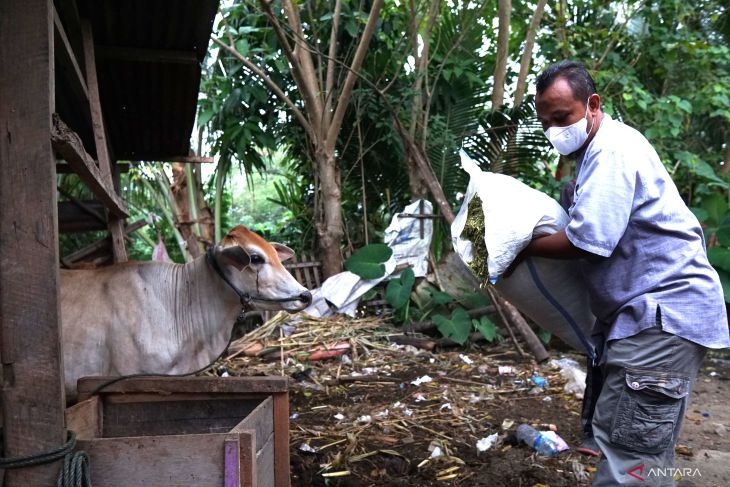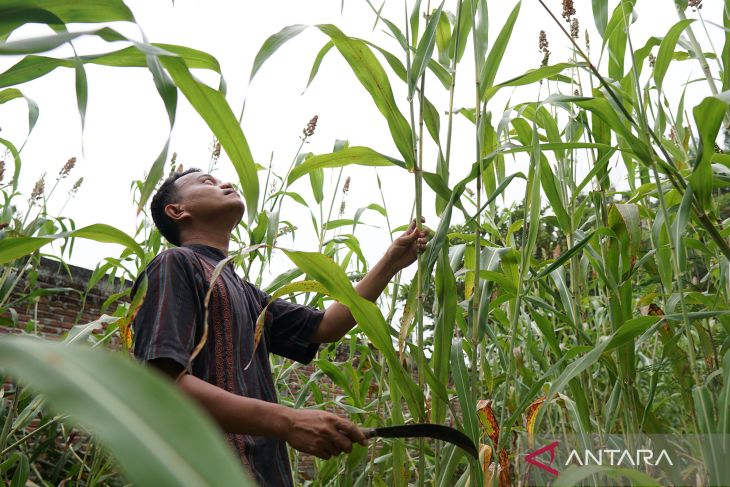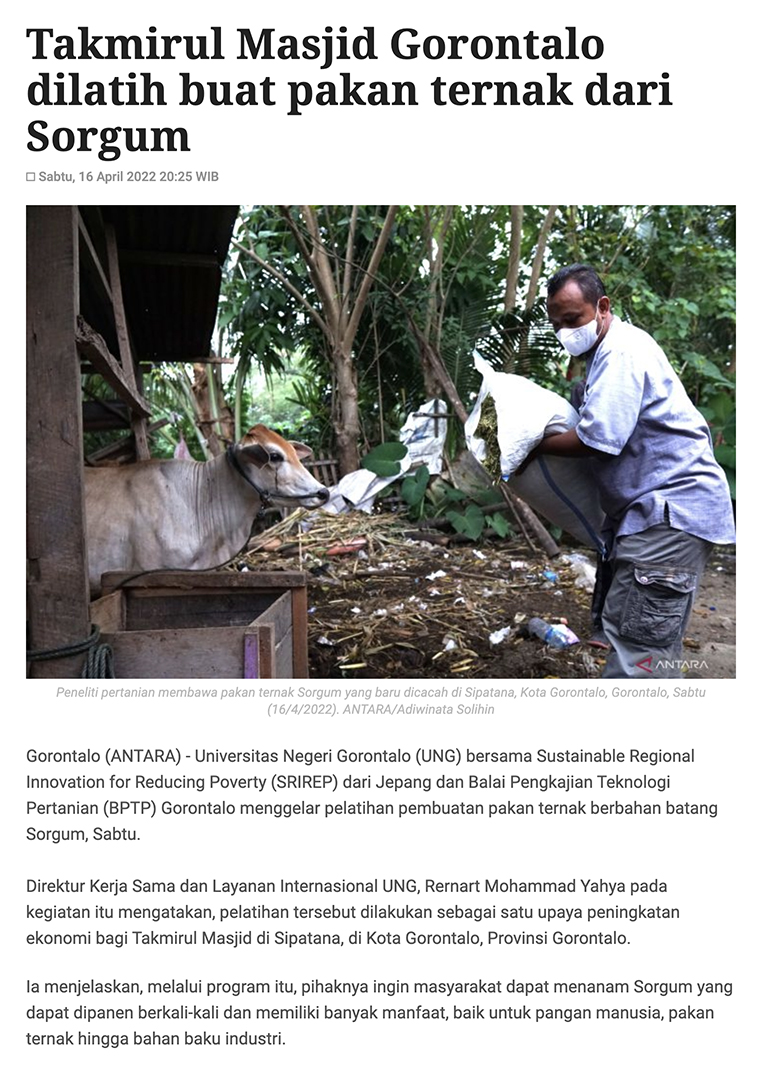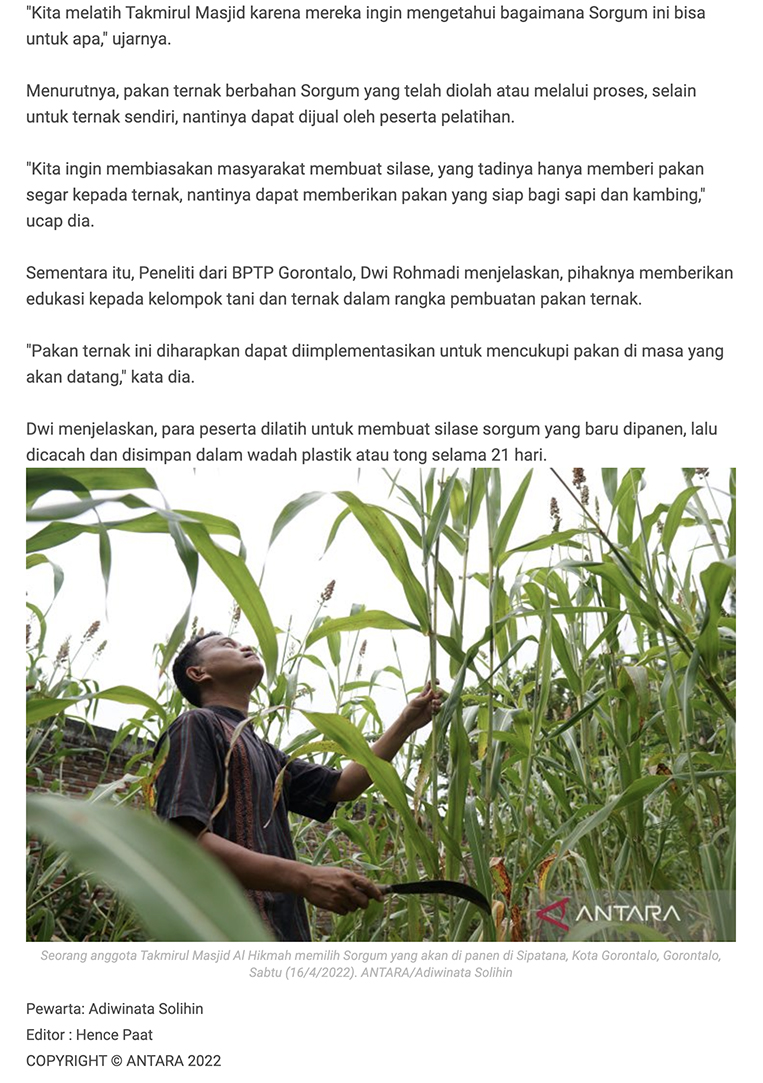English Translation
ANTARA (Gorontalo) – The State University of Gorontalo (UNG), in collaboration with Japan’s Sustainable Regional Innovation for Reducing Risk of High-impact Environmental Pollution (SRIREP), and the Gorontalo Agricultural Technology Study Center (BPTP), presented a seminar on manufacturing animal feed from sorghum stems.
Rernart Mohammad Yahya, Director of International Cooperation and Services at UNG, said that the training was carried out in order to boost the economy of Takmirul Masjid in Sipatana, Gorontalo City, Gorontalo Province.
He stated that his party hopes that with this initiative, the community will be able to produce sorghum, which can be harvested several times and has various advantages for human nourishment, animal feed, and industrial raw materials.
“We train Takmirul Masjid because they want to know what they can do with this sorghum,” he said.
According to him, the training participants may sell animal feed derived from sorghum that has been processed or via a method other than for animals.
“We want to get people acclimated to creating silage, which historically exclusively provided fresh feed to animals, so that they can eventually give ready-made feed for cows and goats,” he said.
Meanwhile, Dwi Rohmadi, a Gorontalo AIAT researcher, noted that his organization gave instruction to farmer and livestock organizations in the context of creating animal feed.
“It is anticipated that this animal feed may be used in the future to provide sufficient feed,” he stated.
Dwi added that the trainees were taught how to create newly harvested sorghum silage, which was then cut and kept for 21 days in plastic containers or barrels.
The original article is published by Pojok6.id on the following URL
https://gorontalo.antaranews.com/berita/194517/takmirul-masjid-gorontalo-dilatih-buat-pakan-ternak-dari-sorgum
Original Indonesian Version (on the Website)
Takmirul Masjid Gorontalo dilatih buat pakan ternak dari Sorgum
Sabtu, 16 April 2022 20:25 WIB

Peneliti pertanian membawa pakan ternak Sorgum yang baru dicacah di Sipatana, Kota Gorontalo, Gorontalo, Sabtu (16/4/2022). ANTARA/Adiwinata Solihin
Gorontalo (ANTARA) – Universitas Negeri Gorontalo (UNG) bersama Sustainable Regional Innovation for Reducing Poverty (SRIREP) dari Jepang dan Balai Pengkajian Teknologi Pertanian (BPTP) Gorontalo menggelar pelatihan pembuatan pakan ternak berbahan batang Sorgum, Sabtu.
Direktur Kerja Sama dan Layanan Internasional UNG, Rernart Mohammad Yahya pada kegiatan itu mengatakan, pelatihan tersebut dilakukan sebagai satu upaya peningkatan ekonomi bagi Takmirul Masjid di Sipatana, di Kota Gorontalo, Provinsi Gorontalo.
Ia menjelaskan, melalui program itu, pihaknya ingin masyarakat dapat menanam Sorgum yang dapat dipanen berkali-kali dan memiliki banyak manfaat, baik untuk pangan manusia, pakan ternak hingga bahan baku industri.
“Kita melatih Takmirul Masjid karena mereka ingin mengetahui bagaimana Sorgum ini bisa untuk apa,” ujarnya.
Menurutnya, pakan ternak berbahan Sorgum yang telah diolah atau melalui proses, selain untuk ternak sendiri, nantinya dapat dijual oleh peserta pelatihan.
“Kita ingin membiasakan masyarakat membuat silase, yang tadinya hanya memberi pakan segar kepada ternak, nantinya dapat memberikan pakan yang siap bagi sapi dan kambing,” ucap dia.
Sementara itu, Peneliti dari BPTP Gorontalo, Dwi Rohmadi menjelaskan, pihaknya memberikan edukasi kepada kelompok tani dan ternak dalam rangka pembuatan pakan ternak.
“Pakan ternak ini diharapkan dapat diimplementasikan untuk mencukupi pakan di masa yang akan datang,” kata dia.
Dwi menjelaskan, para peserta dilatih untuk membuat silase sorgum yang baru dipanen, lalu dicacah dan disimpan dalam wadah plastik atau tong selama 21 hari.

Seorang anggota Takmirul Masjid Al Hikmah memilih Sorgum yang akan di panen di Sipatana, Kota Gorontalo, Gorontalo, Sabtu (16/4/2022). ANTARA/Adiwinata Solihin


